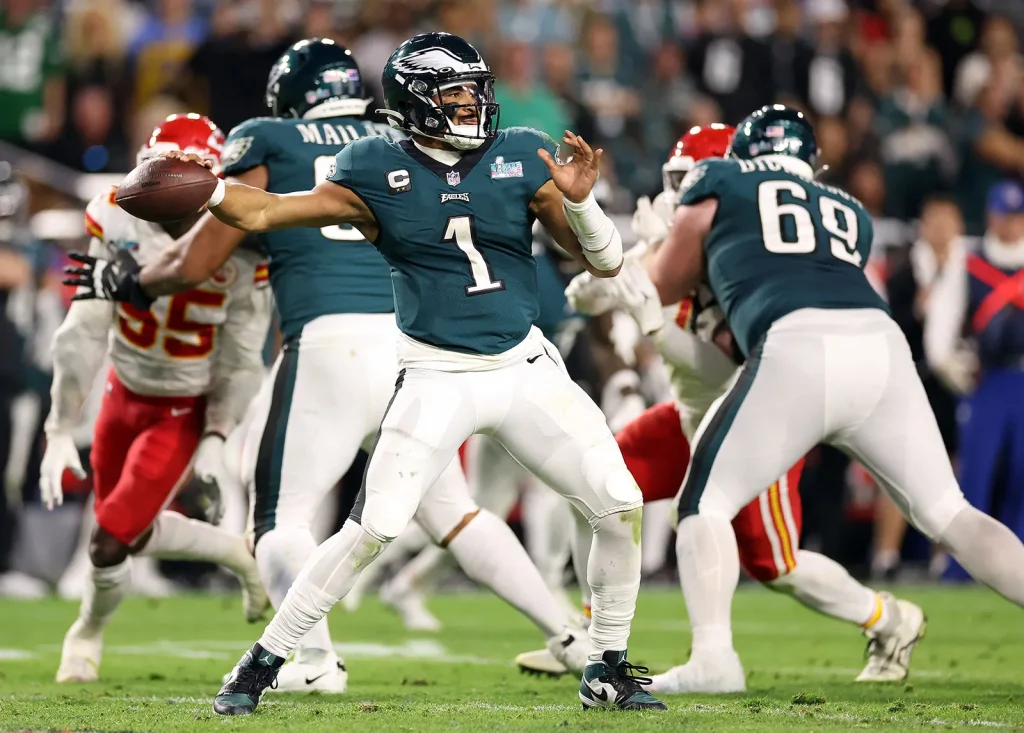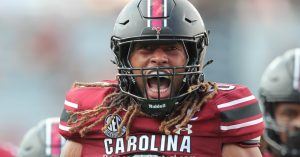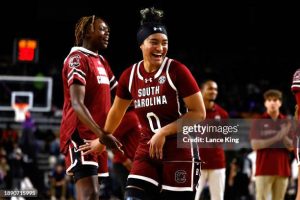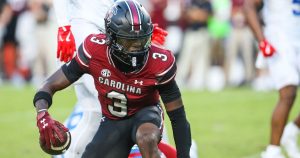
Kellen Moore leaves the Philadelphia Eagles, the Super Bowl champions, to join the New Orleans Saints.
Kellen Moore’s Departure from the Philadelphia Eagles to the New Orleans Saints: A New Era Begins
Kellen Moore, the offensive mastermind behind the Philadelphia Eagles’ victory in Super Bowl LIX, has officially left the team to take on a new challenge as the head coach of the New Orleans Saints. This transition, while relatively swift following the Eagles’ Super Bowl triumph, represents a new chapter in Moore’s promising coaching career. At just 36 years old, Moore is now one of the youngest head coaches in the NFL, and his appointment by the Saints signals a bold shift for a franchise that has been struggling to find its post-Drew Brees identity.
Early Life and Football Journey
Born on July 5, 1988, in Prosser, Washington, Kellen Moore’s rise to prominence in the football world began at a young age. His prodigious talent as a quarterback was evident during his time at Prosser High School, where he was a star athlete. Moore then took his talents to Boise State University, where he became a legend.
Over his four years at Boise State (2008-2011), Moore shattered numerous records and solidified his place in college football history. His 50 career wins as a starting quarterback remain an FBS record, a testament to his leadership and consistency. Moore also finished his college career with an impressive 142 touchdown passes, showcasing his precision as a passer. Despite his success, Moore’s size (standing at 6 feet tall and weighing 200 pounds) and athleticism didn’t meet the typical NFL quarterback standards. He went undrafted in the 2012 NFL Draft, a decision that surprised many considering his college achievements.
The NFL Journey and Transition into Coaching
After going undrafted, Moore signed with the Detroit Lions in 2012, though he played just one season with them. His next stop was with the Dallas Cowboys in 2013, where he found a long-term home as a backup quarterback. Moore’s experience with the Cowboys was invaluable, and he spent several years studying the game and developing his understanding of offensive schemes. He eventually retired from playing in 2017, deciding to pivot to coaching.
Moore’s coaching career began in 2018 when the Cowboys hired him as their quarterbacks coach. He quickly made an impression with his keen football mind and ability to communicate effectively with the quarterbacks. By 2019, Moore was promoted to offensive coordinator, a role he would hold for four seasons. Under Moore’s leadership, the Cowboys’ offense became one of the most dynamic in the league. Moore’s offensive schemes utilized a balanced attack, mixing the run and pass game in ways that maximized the strengths of players like Dak Prescott and Ezekiel Elliott. The Cowboys’ offensive production under Moore ranked among the best in the league, and his innovative play-calling was a major reason for their success during his tenure.
In 2023, Moore took on a new challenge as the offensive coordinator for the Los Angeles Chargers. This move allowed him to work with one of the league’s brightest young quarterbacks, Justin Herbert. In his single season with the Chargers, Moore continued to showcase his offensive acumen, helping Herbert become a top-tier quarterback in the league. His systems and philosophies continued to evolve, drawing the attention of teams across the NFL.
The Philadelphia Eagles’ Super Bowl Victory
When the Philadelphia Eagles hired Moore as their offensive coordinator in 2024, he joined a team that had recently claimed the NFC Championship but fell short of the Super Bowl title the year before. Moore’s arrival immediately provided the Eagles’ offense with an injection of fresh ideas. Head coach Nick Sirianni, known for his offensive-minded approach, welcomed Moore’s expertise in shaping the offense.
In Moore’s first season with the Eagles, his impact was undeniable. Under his guidance, the Eagles transformed into one of the most potent offensive units in the league. Quarterback Jalen Hurts, who had already made a name for himself as a dual-threat quarterback, flourished under Moore’s coaching. Moore built an offense that capitalized on Hurts’ unique skill set, combining designed runs with deep passing plays and quick tempo.
The Eagles’ offensive line, widely regarded as one of the best in the league, also benefited from Moore’s approach. He designed plays that maximized the offensive line’s strengths, while creating schemes that kept opposing defenses on their toes. Running backs like Miles Sanders and Kenneth Gainwell saw their roles expand as well, thriving in Moore’s system that placed a premium on balanced offensive execution.
In Super Bowl LIX, Moore’s offense faced the formidable Kansas City Chiefs. The Eagles’ offense, led by Moore’s strategic brilliance, showcased an exceptional level of execution and adaptability. Hurts delivered one of the most impressive performances in Super Bowl history, throwing for over 300 yards and rushing for multiple touchdowns. The Eagles ultimately triumphed 34-28, marking the franchise’s second Super Bowl victory and cementing Moore’s place as one of the brightest offensive minds in the league.
The Move to the New Orleans Saints
Despite the Eagles’ historic win, Moore’s stay in Philadelphia was brief. Just two days after winning the Super Bowl, Moore agreed to terms with the New Orleans Saints to become the team’s next head coach. This decision came as somewhat of a surprise, given the Eagles’ recent success and Moore’s central role in their Super Bowl victory. However, Moore was drawn to the opportunity to lead a franchise that has been searching for a new identity since the retirement of legendary quarterback Drew Brees and the departure of long-time head coach Sean Payton.
The New Orleans Saints, while a respected team in the NFL, have faced significant challenges in recent seasons. Since their 2020 playoff appearance, the team has struggled to regain the same level of success. The Saints have made a series of moves at quarterback, including the acquisition of veteran Andy Dalton and the development of rookie Jameis Winston, but have not found long-term stability at the position. Additionally, head coach Dennis Allen’s tenure ended with a disappointing 2024 season, leading to his dismissal.
In Moore, the Saints see a dynamic young leader who can revitalize their offense and bring a fresh perspective to the team. Moore’s offensive-minded approach is expected to mesh well with the team’s existing talent, which includes a solid defense, a powerful running back in Alvin Kamara, and a promising wide receiver group. The Saints have also invested heavily in their offensive line, and Moore’s experience with high-level units will be crucial in maximizing their potential.
Moore’s ability to develop quarterbacks will be particularly important for the Saints. The team will likely look to bring in a new signal-caller or develop a current player under Moore’s tutelage. His track record with quarterbacks, especially his success with Dak Prescott and Justin Herbert, has earned him a reputation as one of the league’s top quarterback coaches. If Moore can help the Saints find a franchise quarterback, the team could quickly return to contention.
A New Era for the Saints
For the New Orleans Saints, the hiring of Moore represents a bold step forward. After the long and successful reign of Sean Payton, which included a Super Bowl title and consistent playoff appearances, the Saints have been in search of a new direction. Moore’s hiring signals that the team is ready to embrace a modern offensive philosophy, one that places a premium on innovation and adaptability.
The Saints’ decision to hire Moore also sends a clear message to the rest of the NFL: the franchise is willing to take risks and make moves that could set them up for long-term success. With Moore at the helm, the Saints will have a head coach who is not only young and talented but also forward-thinking in his approach to the game.
Challenges Ahead
While Moore’s potential is undeniable, he will face significant challenges in New Orleans. First and foremost, he must navigate a difficult division in the NFC South, which has seen the rise of teams like the Atlanta Falcons and the Carolina Panthers. The Saints will need to be competitive within their own division to make the playoffs, and Moore’s ability to develop a high-powered offense will be a key factor in achieving that goal.
Additionally, Moore will need to build a strong coaching staff to support his vision. A successful head coach is only as good as the assistants and coordinators around him, and Moore will need to carefully assemble a group that complements his strengths while addressing the team’s weaknesses. Given his experience with various offensive systems, Moore will likely seek out assistants who bring diverse perspectives and can help build a well-rounded coaching staff.
Finally, Moore will need to quickly establish a winning culture in New Orleans. The Saints have a storied history of success, but recent years have been marked by inconsistency. Moore’s leadership will be essential in motivating his players and creating a culture of accountability, discipline, and excellence.
The Road Ahead
Kellen Moore’s journey from an undrafted quarterback to a Super Bowl-winning offensive coordinator to an NFL head coach is a remarkable story of growth and perseverance. His appointment as the head coach of the New Orleans Saints marks a new era for the franchise, one filled with promise and optimism. As Moore takes the reins of the Saints, all eyes will be on him to see how he shapes the future of the team and the broader NFL coaching landscape.
For the Saints, the hope is that Moore can recreate the success he found in Philadelphia, bring a dynamic offense to New Orleans, and lead the team back to prominence. The future is undoubtedly bright for Kellen Moore, and his time in New Orleans is just beginning.





